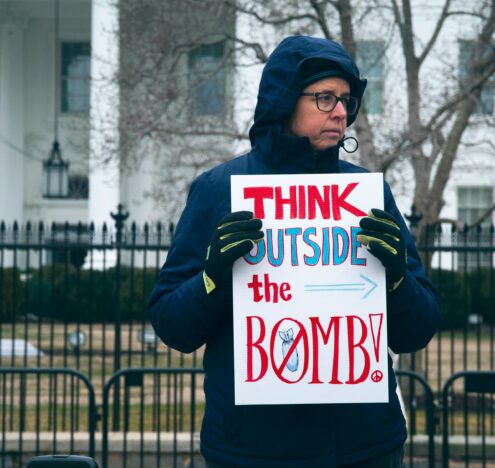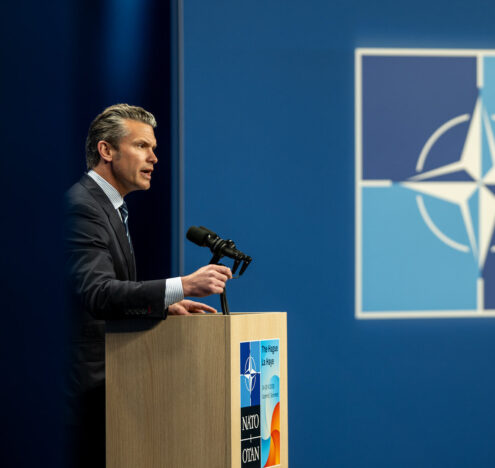The accolades showered upon “Oppenheimer” at the Oscars this past Sunday shined a spotlight on the very real existential threat that nuclear weapons still exert over human civilization. As director Christopher Nolan reminds us, “Our relationship with the fear of nuclear weapons ebbs and flows with the geopolitical situation, and it shouldn’t, because the threat is constant … The truth is, nuclear weapons are an extraordinarily dangerous thing to have lying around the house.”
It’s a wake-up call about the catastrophic danger we all live under every moment of every day due to the continued existence of nuclear weapons. We need policymakers in Congress to move away from the tendency to rely on nuclear weapons for security and toward a new security paradigm that is not dependent on weapons that can end human civilization. US Representative Jim McGovern is asking members of Congress to heed this call by cosponsoring House Resolution 77.
For McGovern, the problem is the lack of urgency surrounding this issue in Congress. He introduced the bill as a way for members of Congress to signal their agreement that there is an urgent need for the United States to change course and prioritize negotiations among all nuclear-armed states for the reduction and eventual elimination of nuclear weapons from the world. Such action would be consistent with the existing US commitments to nuclear disarmament under the Article VI of the Treaty on the Non-Proliferation of Nuclear Weapons.
Weakening the Nuclear Taboo
The need for such urgency is clear. Over the past two years, repeated Russian threats to use nuclear weapons in the war in Ukraine have dramatically weakened the “nuclear taboo.” The risk of a potentially civilization-ending nuclear war has risen to levels some experts say is at least has high as during the Cuban Missile Crisis. Rather than turning back from the brink of nuclear war, nuclear armed states are accelerating nuclear weapons spending. The US alone is estimated to spend $756 billion on nuclear weapons in the next 10 years and $1.7 trillion over the next three decades.
McGovern understands that the story of nuclear weapons will have an ending. It will either be the end of nuclear weapons or the end of human civilization. We have been incredibly fortunate throughout the nuclear weapons era. As Robert McNamara famously declared after the Cuban Missile Crisis, “We lucked out. It was luck that prevented nuclear war.”
The policies of the nuclear weapons states are essentially a hope that this luck will continue. But hoping for good luck is not an acceptable security policy and, sooner or later, our luck will run out.
This is the policy of nuclear deterrence. Unfortunately, every technology made by man fails eventually. Every human being fails sometimes. And when the technology is nuclear weapons, failure could mean the end of human civilization. We already have a documented history of near civilization ending nuclear accidents, miscalculations, and technical errors. Our luck won’t last forever.
Nuclear Weapons Lack Utility
Nuclear weapons also increasingly lack utility. All technologies have life cycles and are eventually replaced by newer technologies. This is Cold War technology that has progressively less utility over time. They do nothing to protect us from cyber warfare, pandemics, the climate crisis, weaponized AI, or autonomous weapon systems. Yet we are planning to spend $1.7 trillion in taxpayer money over the next 30 years to hold onto these legacy weapon systems for another 50 years.
This happens because nuclear weapons policy isn’t always based on clearly defined needs. It is often influenced by the interests of defense industry lobbyists. One clear example of this is illustrated in a recent article published by Responsible Statecraft and The Guardian highlighting that nine of the 12 members of the high-level congressional committee, the Congressional Commission on the Strategic Posture of the United States, charged with advising on the US’s nuclear weapons strategy have direct financial ties to contractors that would benefit from the report’s recommendations or are employed at think tanks that receive considerable funding from weapons manufacturers.
As a result, this commission is recommending that the US go beyond the $1.7 trillion in planned spending and order even more weapons. This is based on the misguided and unexamined assumption that more weapons equals more safety. The US strategy is to just build more nukes.
It’s a mathematical solution to a problem that doesn’t have a defined mathematical need. How many weapons do you actually need to hold an enemy at risk? What amount of damage do you credibly need to threaten? How much damage are you willing to sustain before you know you need to adjust your strategy? There is no detail about the numbers necessary to justify specific missions, yet it still suggests a major increase in numbers.
Building a Counter-Narrative
We need a powerful counter-narrative in Congress. House Resolution 77 is a call to change the starting assumption from “nuclear weapons make us safe” to “nuclear weapons are our greatest risk.” Nuclear deterrence is a Faustian bargain: if we hold each other in increasing levels of catastrophic risks, it posits, we will be safe. But there is no quick-strike solution to the problem. We need to carefully untie this Gordian knot with education.
Some in Congress might say that they like the idea of a world without nuclear weapons, but that it is idealism in a time that demands realism. But the realist view is that nuclear deterrence will eventually fail. Ignoring that reality and simply continuing to build more nukes in the unexamined belief that they will equal more safety is the height of idealism. The longer we hold on to them the greater the risk grows as more nations will try to acquire them, increasing the risk of conflicts escalating into nuclear war.
Tragically, the Cold War architecture of arms control has largely been dismantled. We need to honor these Cold War accomplishments by de-escalating tensions, restoring guardrails, and beginning new negotiations for a world free of all nuclear weapons. Congressional policymakers can begin restoring urgency by supporting efforts that take aim at nuclear weapons.




















